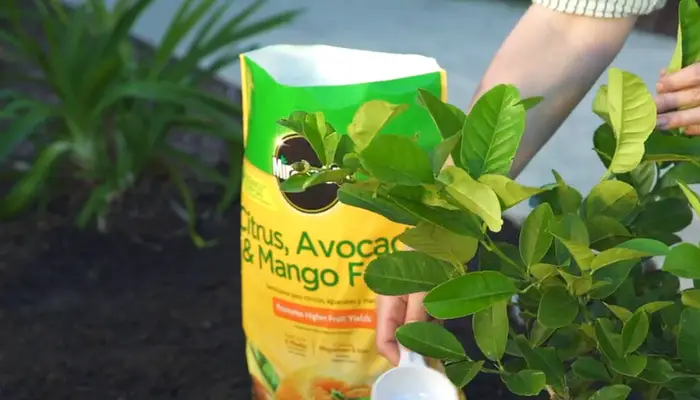How many oranges do you expect in one year? If it is a mature tree, your expectation should be around 300. But sadly, that does not happen to many gardeners. Now you may ask, why so?
Well, first of all, Orange trees are heavy feeders. It is not that easy to come up with plenty of Oranges, dark green leaves & progressive growth simultaneously. That’s why most of the time, poor scheduling with an unfit fertilizer hits hard.
I hope not, but if that’s what your problem is, I can help you. This article comes with the solution to both issues. It provides a thorough review of the 7 best fertilizers for your Orange trees along with a proper fertilization schedule.
So, without wasting another second, let’s dive into the result of my extensive research.
Top 7 Fertilizer For Orange Trees- Comparisons
| Fertilizer | NPK | Form | Type | Price |
|---|---|---|---|---|
| Miracle-Gro Citrus Plant Food | 10-15-15 | Spike | Semi-Organic | |
| Jobe’s Citrus Granular Fertilizer | 3-5-5 | Granular | Organic | |
| Miracle-Gro Citrus Plant Food | 8-2-10 | Granular | Synthetic | |
| Espoma Citrus-Tone | 5-2-6 | Granular | Organic | |
| Jobe’s Citrus Fertilizer | 3-5-5 | Spike | Organic | |
| J R Peters Inc Jack’s Classic Citrus Food | 20-10-20 | Granular | Synthetic | |
| Dr. Earth Citrus & Fruit Fertilizer | 5-5-2 | Granular | Organic |
Top 7 Fertilizer For Orange Trees- Reviews
1. Miracle-Gro Fruit & Citrus Plant Food Spikes
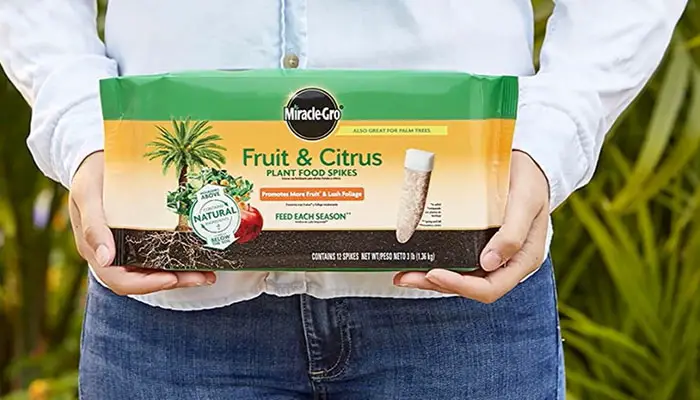
Have you heard about the plant-based COVID-19 vaccine? A company called “Medicago” is developing one. And guess what? Miracle-Gro is working with them! Well, to me, it is not that surprising. A giant company like Miracle-Gro should step up in such projects along with producing premium quality fertilizers. Anyway, Let’s talk about this fertilizer.
Sources & Nutrients
Miracle-Gro Fruit & Citrus Plant Food is a fusion of ecologically sound organic & chemical compounds like ammonium sulfate, ammonium phosphate, feather meal, bone meal, magnetic rock, manganese sulfate, etc. Thereby, it is a semi-organic fertilizer.
According to the product label, the fertilizer provides primary nutrients (10% N, 15% P, 15% K), secondary nutrients (8% S) & micronutrients (0.1% Fe & 0.05% Mn). But my research adds some more nutrients to the list, such as Ca, Mg, Na, etc.
Guaranteed Analysis
You already know that orange trees require a higher amount of N & K than P. But the NPK ratio (10-15-15) of this fertilizer is not so welcoming.
It says that the fertilizer carries 10% N, 15% P & 15% K, not matching, right? Well, it suits when 0.2% water-insoluble nitrogen ensures a long time of feeding. In such a way, N will be available as long as the P & K are working & therefore, a little low N won’t make a difference.
Additionally, the fertilizer adds 9.8% ammoniacal nitrogen to feed your oranges & makes the soil a little acidic for the growth of orange trees. And interestingly, 8% sulfur does the same.
Striking Properties
“Enhanced fruit production”- is the company’s promise to the customers. And it is pretty much obvious with such nutrient composition.
Besides, its spike formation makes it the best fertilizer for orange trees in containers. Only a spike fertilizer can guarantee no leaching away & relieve you from all those pre-applying calculations.
Furthermore, the fertilizer bears natural ingredients like bone meal, feather meal, and magnetic rock to nourish your orange tree as well as its soil. Quite a good deal, right?
Applying Procedure
For an in-ground orange tree, first of all, draw a dripline & measure its diameter. For a 4 feet diameter, insert 1 spike at the dripline but make sure the soil is soft or slightly wet before inserting. Apply the spikes once in spring & again during fall.
2. Jobe’s Organics Fruit & Citrus Granular Fertilizer

Products of Jobe’s Organics are a usual sight of a gardener’s storeroom or, may I say, gardening room. Well, why won’t that be?
With experience & a reputation of over 50 years, Jobes Organics is truly dominating the market. Take this fruit & citrus fertilizer as an example of their excellence-
Sources & Nutrients
Jobes Organics Fruit & Citrus Plant Food is OMRI listed for organic use as it contains all-natural products like feather meal, bone meal, processed poultry manure & sulfate of potash.
And all these compounds combinedly supply 3% N, 5% P, 5% K, 8% Ca, 0.5% Mg & 1.6% S.
Guaranteed Analysis
Like the previous one, Its NPK ratio (3-5-5) is not matching. And the reason is pretty much the same. This granular plant food bears 1.2% water-soluble & 1.8% water-insoluble fertilizer to ensure both instant & long-term N feeding. As Orange trees highly thrive for N, it is definitely a grand arrangement.
However, you may have noticed the presence of Ca in high quantities. You know, Ca is the most abundant mineral in orange trees by tree weight & citrus trees like oranges require a high amount of Ca for both structural & physiological growth.
Striking Properties
The feature that made me smile is the presence of Jobes BIOZOME. It is a blend of healthy & beneficial microorganisms like bacteria, Mycorrhizal fungi, and Archaea, which improves the soil quality of your garden & makes it a favorable host for citrus trees like Orange, Lemon, Avocado & also nuts.
Applying Procedure
For an in-ground orange tree, draw the dripline. Sprinkle 3 cups per 1-inch trunk diameter following the dripline & water thoroughly.
3. Miracle-Gro Citrus Plant Food
Once again, a Miracle-Gro product for you. Like all other Miracle-Gro products, this fertilizer is striking & additionally, gardeners have found this fertilizer equally effective for most Orange tree varieties like Navel, Valencia, Hamlin, Clementine, Tangelo, etc. More details-
Sources & Nutrients
This Shake ‘N Feed fertilizer comes with a heavily enriched nutrient composition. It supplies 8% N, 2% P, 10% K, 6.9% Ca, 5.5% Mg, 4.7% S, 0.05% Cu, 0.92% Fe, 0.34% Mn & 0.11 Zn. The good news is, these 10 essential nutrients are the prominent ones that Orange trees thrive for.
Anyway, organic gardeners may get a little upset as this amazing formula is a combination of several inorganic compounds like polymer-coated ammonium nitrate, ammonium phosphate, dolomitic limestone, etc.
Guaranteed Analysis
Interestingly, multiple sources of this fertilizer are polymer-coated & thereby continuously feed your citrus trees like oranges for up to 3 months. For example-
The fertilizer contains 0.08% water-insoluble, 4.14% polymer-coated N & 1.74% polymer-coated P to ensure a slow-release for long-term feeding. Moreover, the plant food has derived N from 3 different sources for maximum uptake & thus, it guarantees no N deficiency at all.
Striking Properties
I have selected this fertilizer mainly for two reasons. Firstly, it contains compost which increases the organic matter of the soil & thereby nourishes both above & below it. And secondly, such an enhanced nutrient composition. Probably that’s why it is considered the best fertilizer for citrus trees like Avocado, Orange, Mango, Citrus, Lemon, etc.
Applying Procedure
First of all, measure the drip line diameter. Don’t bother if the dripline passes the container. apply 3 tablespoons of the fertilizer evenly onto the soil for a 14″ diameter. After that, water thoroughly.
4. Espoma Citrus-Tone
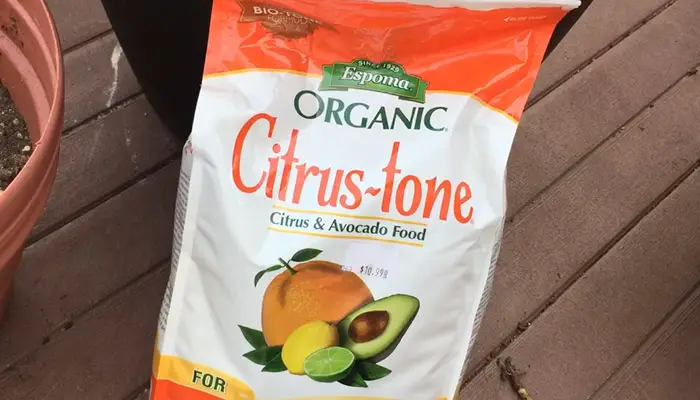
The Espoma brand has been serving us for nearly a century now. Its responsible approach towards organic gardening has been a constant companion of the gardeners so far. Likewise, Espoma Citrus-Tone is no different from that. In fact, I call it the best organic fertilizer for Oranges. Care to know why? Let’s see-
Sources & Nutrients
The California Department of Food & Agriculture has approved this fertilizer for its 100% organic nature. Well, it is certain. If you use feather meal, bone meal, alfalfa meal, poultry manure, greensand, sulfate of potash & sulfate of potash magnesia to blend a plant food, it deserves approval like that.
Anyway, the company guaranteed that the fertilizer supplies 5% N, 2% P, 6% K, 5% Ca, 0.5% Mg & 1% S, but the good news is, it also provides some other micronutrients, such as Cu, Zn, Fe, Mn, etc.
Guaranteed Analysis
First of all, I want to light upon the NPK ratio (5-2-6). According to several scientific studies, a higher amount of N & K than P is ideal for Orange trees & this fertilizer totally goes with it.
And secondly, it contains 3% water-insoluble N that can feed your Orange trees for up to 3 months continuously. Moreover, the fertilizer bears both ammoniacal nitrogen & water-soluble nitrogen for hungry citrus trees to uptake instantly.
Striking Properties
The fertilizer company promises bigger & tastier fruit with a long-lasting impact on your Orange, Citrus, Avocado & Nut trees. But the feature that strikes many consumers is the exclusive BIO-TONE formula. It is a blend of colony-forming soil bacteria that helps in making the soil fertile & well-drained.
Plus, the fertilizer comes with 1% humic acid to increase the soil microbial activity, drought resistance, nutrient uptake & such others. So after all these, won’t you call it the best?
Applying Procedure
For potted Orange trees, sprinkle 3 teaspoons evenly onto the soil of a 12″ pot. After that, rake the soil slightly & water evenly.
5. Jobes Organics Fruit & Citrus Fertilizer Spikes

Jobes Organics beats again, but this time in spike formulation. As I said, you can trust this brand because they don’t compromise the quality of the product. And thereby, I present to you the best natural fertilizer for your Orange trees. Check out why it is the best-
Sources & Nutrients
Since the fertilizer is OMRI-approved, you can easily assume that each spike contains natural & organic compounds. Yes, you are right. It is a combination of feather meal, bone meal & sulfate of potash.
And the NPK ratio of the fertilizer is 3-5-5. That means each spike contains 3% N, 5% P & 5% K. Exactly like the granular one, right?
But the good news is, that the sources also provide other micronutrients like Ca, Fe, Mn, Zn, etc.
Guaranteed Analysis
The fertilizer carries both water-insoluble (1.8%) & water-soluble (1.2%) N to feed your Oranges trees both instantly & slowly. Thereby it ensures long-term N feeding for lush greens & strong plant structure.
Furthermore, P & K seems perfect concerning the orange tree’s requirement.
Striking Properties
Every spike is specially manufactured for potted citrus plants like Orange, Avocado, Lemon, Apple, Plum, Peach, Lime, and nuts.
But the most exclusive feature is surely the unique blend called Jobe’s BIOZOME.
BIOZOME is a blend of bacteria, Mycorrhizal fungi, and Archaea which break down the organic matter of the soil, keep it fertile, loose & well-drained. Therefore, BIOZOME makes a long-term positive impact on your garden soil.
Besides, the fertilizer brings you some extra facilities due to its spike form. For example, it ensures no surface runoff, direct feeding at the root zone, pre-measured formula, easy application & such others.
Applying Procedure
For potted Orange trees, take 2 spikes for a 12″ pot and insert the spikes following the container edges. Now, you can relax for the next 4-6 weeks but, don’t forget to water.
6. J R Peters Inc Jack’s Classic Citrus Food

Jack’s Classic Citrus Feed is best known for its well-researched nutrient composition for Citrus plants. Undoubtedly, it bears the most enhanced configuration among all that I have mentioned. Care to venture more? Let’s go-
Sources & Nutrients
Can be a little disappointing for organic gardeners but this fertilizer combines the perfect eco-friendly inorganic chemicals to make an ideal blend. Some of the sources are urea, potassium nitrate, potassium sulfate, iron EDTA, manganese EDTA, etc.
The nutrient part of this feed is truly charming as it supplies 11 essential nutrients alone & those are 20% N, 10% P, 20% K, 1% Mg, 4.9% S, 0.02% B, 0.05% Cu, 0.15% Fe. 0.075% Mn, 0.0009% Mo & 0.05% Zn.
Guaranteed Analysis
The fertilizer works instantly as all of its nutrients are water-soluble. That means it is an instant feeder. Moreover, the NPK ratio (20-10-20) seems more perfect for established orange trees than seedlings.
Interestingly, the fertilizer carries N from 3 different sources so that Orange trees can uptake N in every possible form & never feel a deficiency. Additionally, it contains 5 micronutrients that are vital for Orange trees. I must say that the company has not left any stone unturned!
Striking Properties
Apart from Orange, you can use this fertilizer for citrus plants & tropical fruiting plants like Grapefruits, Meyer Lemons, Lime, Mango, kumquat, etc.
But the surprising fact is, that the fertilizer contains Cu, Fe, Mn & Zinc in chelated form. You know, chelates are organic compounds that keep these nutrients away from being involved in any destructive soil reaction & make them available at the root zone for continuous uptake. Impressive, right?
And finally, I have to admit that you won’t find a better water-soluble fertilizer for your Orange trees than this.
Applying Procedure
Mix 1 tablespoon of fertilizer with 1 gallon of water and apply every 7-10 days. Interestingly, you can apply it both as a soil drench or foliar spray.
7. Dr. Earth Citrus & Fruit Fertilizer
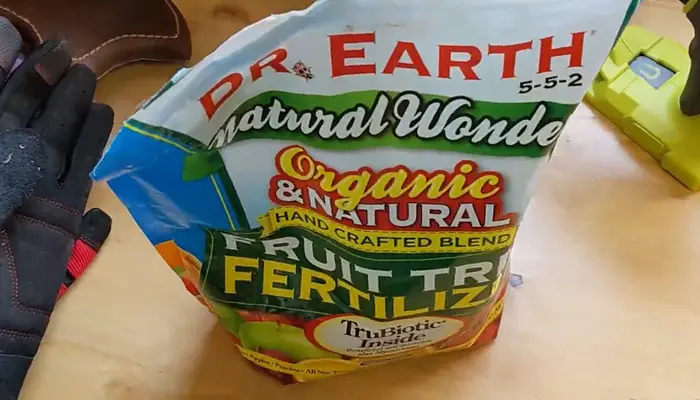
My last recommendation is a Dr. Earth plant food. A list of plant fertilizers seems incomplete without Dr. Earth’s product. It is not easy to ignore those innovative formulas that are specially made for particular plants. Likewise, check out this Citrus feed. Who knows, it can alter your decision-
Sources & Nutrients
When you use feather meal, fishbone meal, bone meal, alfalfa meal, potassium sulfate, kelp flour, rock phosphate & kelp meal to blend a fertilizer, pretty much certain that it will be approved by OMRI, CDFA & NOP for organic use. And that’s exactly what happened to this fertilizer.
However, combinedly these sources add 5% N, 5% P & 2% K to your garden soil for bountiful oranges. Though the company has not mentioned it, the sources also supply some essential macro & micronutrients to feed you Orange trees.
Guaranteed Analysis
The fertilizer contains 5% N & all of it is water-insoluble. Thus it feeds your Oranges trees continuously for up to three months straight.
You may have noticed that it contains a higher amount of P. Well, during the first one or two years, Orange trees need an almost equal amount of P compared to N. And that’s why it is an excellent fertilizer for orange seedlings.
Striking Properties
First of all, I want to mention that this natural wonder is a hand-crafted blend. It is people & pet-friendly & suitable for oranges, all fruit trees, avocados, berries, nuts, grapes, vines & so on.
Secondly, along with the natural & organic sources, it holds “TruBiotic”- a blend of colony-forming bacteria & fungi. This unique blend takes care of the soil & turns it into an excellent host for Orange trees.
Thirdly, the fertilizer contains 9% humic acid to make the soil organically rich, well-drained & fertile. And finally, the fertilizer does not include any GMO product because it is not good for the environment & the genetic uniformity of the plants.
Applying Procedure
For in-ground Orange trees, first of all, draw the drip line & then measure the trunk diameter. Sprinkle 1 cup of the fertilizer for every inch of trunk diameter following the dripline. After that, slightly work on the soil & water.
What Nutrients Do Orange Trees Need?
Like every other tree, oranges need 3 types of nutrients for perfect growth & fruiting. These are-
- Primary Nutrients (C, H, O, N, P & K)
- Secondary Nutrients ( Ca, Mg, S) &
- Micro-Nutrients (Fe, Mn, Zn, Cu, B, Mo, etc)
Interestingly, Orange trees can uptake C, H & O from the air & water but depend on soil for the rest. Among these three types, Orange trees need primary nutrients in a higher amount, secondary nutrients in moderate quantity & micronutrients in tiny ratios.
However, scientists have made a list of nutrients relatively more mandatory for outstanding growth with lush foliages & king-sized oranges. Here’s the list- N, P, K, Ca, Mg, Zn, B, Fe, Cu & Mn.
When to Fertilize The Orange Tree?
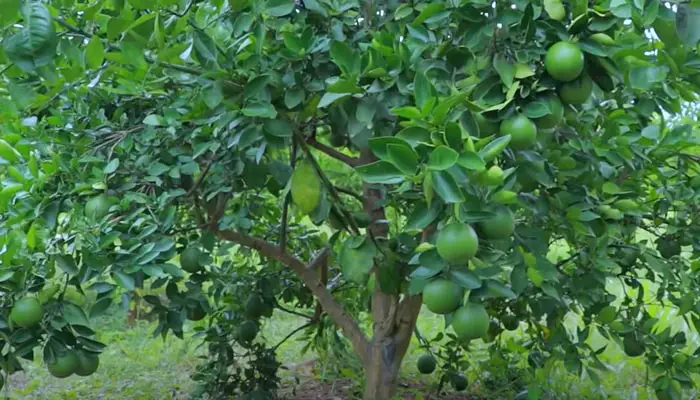
You need to fertilize your orange tree at the following times-
- When there is a deficiency in the soil
- When your Orange tree is actively growing
- When your Orange tree starts blooming &
- When your Orange tree starts fruiting
Well, in case of soil deficiency, it is better to test the soil once a year & take action accordingly. Coming to the “Actively growing” part, you should know that there are two types of active growth.
Generally, Orange trees take up to 3 years to start fruiting. So, until it starts fruiting, the time is called the non-fruit bearing phase. During this phase, the traditional fertilizing schedule is given below-
- First year: Start fertilizing after 3 weeks of planting & keep fertilizing from late winter to early fall. Start with a low NPK fertilizer.
- Second year: Fertilize your plant once every two months with slightly higher NPK fertilizer.
- Third year: Increase the NPK ratio & fertilize your Orange trees once every three months.
By this time, your Orange tree should start fruiting. So, from the 4th year, the plant enters into the fruit-bearing phase & which changes the fertilizing schedule a little bit.
From now on, fertilize your Orange plant only during the growing season, which means spring & summer. During these two seasons, you will notice scented blooming & bountiful fruit. Thereby, follow the given schedule-
Fertilize your Citrus plants like Orange, Lemon, Avocado, Lime, etc. 3 times every year.
- For profuse flowering, apply the first dose in late winter (February).
- For perfect fruit setting, apply the second dose in late spring (May).
- For proper plant & fruit growth, apply the third dose in late summer (August).
How To Fertilize An Orange Tree?
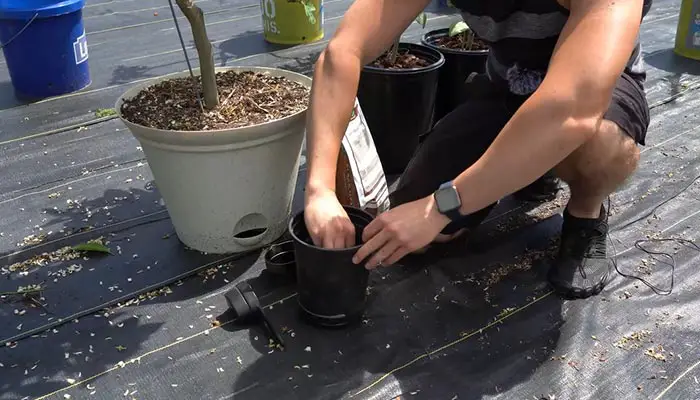
Fertilizing an orange tree is quite easy. You may know that there are mainly three types of fertilizers available in the market. These are-
- Granular Formulation
- Liquid Formulation &
- Spike Formulation
For Granular Formulation
- First of all, draw the dripline, whether in-ground or pot & then measure the drip line diameter, pot diameter or trunk diameter.
- Now take a look in the direction provided with the product. You should find a convenient dose in relation to the drip line diameter or pot diameter of trunk diameter.
- Once you know which application rate to follow, measure the exact amount of granules & apply them accordingly. Mostly there are two ways two apply granules. Either following the dripline only or spreading evenly onto the dripline circle of the soil surface.
- After that, rate the soil a little bit & water it properly.
For Liquid Formulation
- Like the granular formulation, draw dripline & measure drip line diameter, trunk diameter or pot diameter in case of potted plants.
- Take the exact amount of granules & mix them with water following the most suitable application rate given on the product label.
- Apply the liquid at the base of the Orange tree. But avoiding trunk & foliage is advised.
For Spike Formulation
- Similarly, draw a dripline, and calculate the drip line diameter, pot diameter, or trunk diameter.
- Take the accurate number of spikes according to the directions & insert them following the dripline. But for potted Orange trees, push the spikes along with the pot edges.
- Water thoroughly.
Homemade Fertilizer For Orange Trees
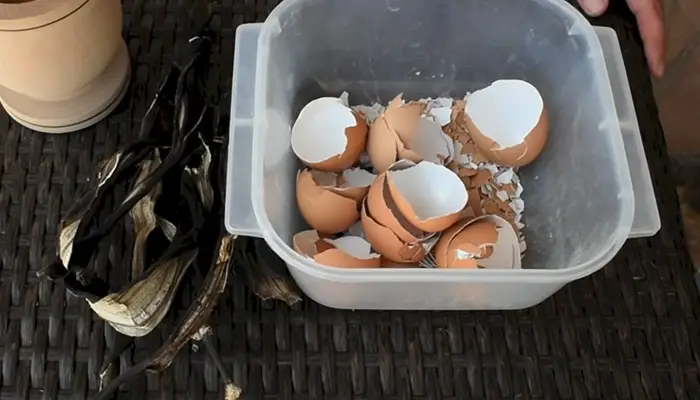
If you know the characteristics of a perfect fertilizer for Orange trees, it would be a lot easier to brew a homemade fertilizer. Plus, you can even come up with your personal formula. So, what is the best fertilizer for Orange trees?
Briefly, any fertilizer that contains both macro & micronutrients, makes or keeps soil acidic, provides equal or higher N & K than P (better) & takes care of the soil medium is primarily ideal for Orange trees.
Following this instruction, here is an excellent DIY Orange tree fertilizer for you-
Ingredients:
- Coffee Grounds
- Bone meal
- Dried Banana Peel
- Dried Onion Skin
- Eggshell powder
- Molasses
- Celery
Procedure:
The Mixing ratio is 35:15:30:8:4:4:4. Which means 35% coffee grounds, 15% bone meal, 30% dried banana peel, 8% dried onion skin & the remaining 4% each.
Application Method”
Apply this fertilizer thrice a year- in late winter, late spring & late summer.
Note: The fertilizer supplies N, P, K, Ca, Mg, S, Fe, Mn, B & such other essential nutrients to feed your Orange trees.
Frequently Asked Questions
Is Miracle Grow Good For Orange Trees?
Both Miracle-Gro Fruit & Citrus Plant Food Spikes & Miracle-Gro Citrus Shake ‘N Feed Continuous Release Plant Food are excellent fertilizers for orange trees. These fertilizers come with a remarkable nutrient composition & soil-enriching amendments to get the best out of your Orange trees.
Are Coffee Grounds Good For Orange Trees?
Two major prerequisites of orange trees are available nutrients & acidic soil. Coffee Grounds ensure both. They supply several nutrients like nitrogen, phosphorus, magnesium, copper, potassium, etc. Plus coffee grounds make the soil a bit acidic. So, no harm in using it.
Coffee grounds are mainly used to supply nitrogen to the plant that helps to protect from yellowing the leaves of orange trees.
Is Epsom Salt Good For Orange Trees?
Magnesium & Sulfur are two salient nutrients that Orange trees thrive on. These nutrients confirm several issues like proper phosphorus uptake, an increase of juice content, keeping soil acidic & such others. Epsom Salt supplies both Mg & S to feed your orange trees. Apply once a month maintaining 2 teaspoons per gallon of water.
Is Milk Good For Orange Trees?
Milk is an excellent source of calcium & Orange trees also require Ca. So in case of deficiency, you can use unpasteurized cow’s milk to feed your Orange trees.
What Kind Of Soil Do Orange Trees Like?
Slightly acidic sandy loam soil is an ideal medium for Orange trees. Just make sure that the soil is well-drained, organically rich, the soil pH is between 6-6.5 & water does not stay for long.
Are Eggshells Good For Citrus Trees?
Eggshells are jam-packed with Calcium & other essential trace elements that orange trees love. Calcium is essential for both the structural & physiological growth of orange trees. Plus eggshells keep the soil acidic. So, using crushed eggshell powder in the proper amount brings no harm to your Orange trees.
Final Words
Most of the Orange varieties tend to ripen around mid-fall to mid-spring. And next time when your Orange trees go through the ripening season, I want to see a big smile hanging on your face.
I can wish that, right? I have tried my best to talk about the 7 best fertilizers for your Orange trees in detail & now it is your turn to make the right choice.
I hope my research comes in handy for you. And once you read the article, I am sure you won’t lose that ample reward over a wrong purchase.
Let me know the results. Thank you.
Read More
